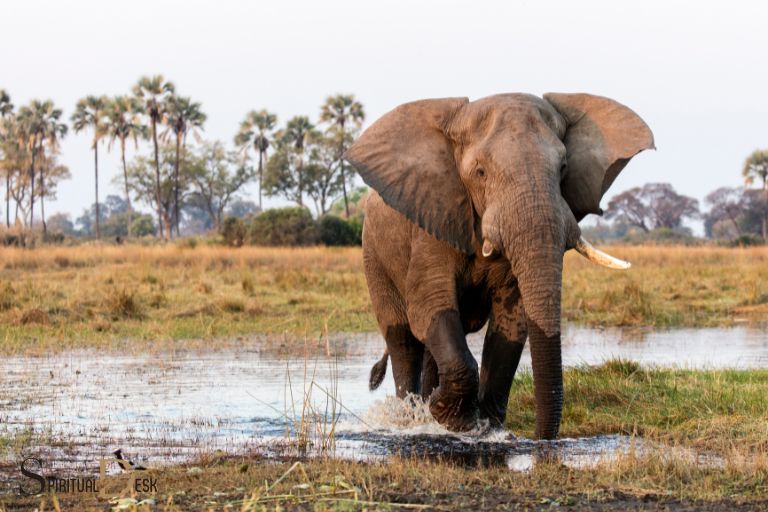Spiritual Meaning of Elephants in India: Compassion!
In India, the elephant has generally seen as a symbol of strength, wisdom, stability, and power. It is believed that elephants can bring good luck and fortune.
Elephants also symbolize protection and compassion, as well as symbolizing a strong connection between earth and sky.
India has a deep-rooted connection with elephants, seen in various religious texts, folklore, and cultural traditions.
The elephant is depicted as a divine creature, possessing immense wisdom and strength. It symbolizes patience, commitment, and steadfastness.
These attributes are associated with Lord Ganesha, the Hindu god with an elephant head, worshipped across India for good fortune and wisdom.
In India, the elephant is seen as a symbol of spiritual power and grace. For Hindus, it symbolizes protection, compassion, and the deep connection they have between the earth and the sky.
The spiritual meaning of elephants in India points to the greater significance of this majestic creature in their culture and beliefs.
8 Aspects: Elephants in Indian Spirituality
| Aspect | Spiritual Meaning |
|---|---|
| Symbolism | Elephants in India symbolize wisdom, strength, loyalty, and longevity. |
| Ganesha | Lord Ganesha, one of the most popular deities in Hinduism, has an elephant head, representing intellect, wisdom, and the removal of obstacles. |
| Temples | Elephants are often associated with temples and are used in religious ceremonies, symbolizing divine presence and blessings. |
| Vahana | Elephants are considered as the vahana (vehicle) of Lord Indra, the god of thunder and rains, symbolizing power and authority. |
| Marriage processions | Elephants are used in marriage processions, representing a prosperous and successful union. |
| Jataka tales | In the Jataka tales, Buddha is sometimes portrayed as an elephant, symbolizing his compassion, serenity, and strength. |
| Royal status | Elephants have been associated with royalty in ancient India, symbolizing wealth, power, and prestige. |
| Auspiciousness | Elephants are considered auspicious animals in Indian culture, and their presence is believed to bring good fortune and prosperity. |
Key Takeaway

Four Facts About: Spiritual Meaning of Elephants in India
Introduction To The Elephants In Indian Culture
India, a land rich in culture and tradition, is known for its deep spiritual roots. Among the various symbols and creatures that hold significance in the indian culture, the majestic elephant stands tall, both figuratively and literally.
With its close ties to religion, mythology, and daily life, the elephant has earned a special place in the hearts of the indian people.
Importance Of Elephants In Indian Traditions:
- Elephants have long been revered as sacred creatures in indian traditions.
- These gentle giants are seen as a symbol of strength, longevity, and wisdom.
- They are often associated with deities and are believed to bring good fortune and blessings.
- In religious ceremonies and festivals, elephants play a vital role, carrying the idols of hindu gods and goddesses on their backs.
- Elephants are also seen as a symbol of wealth and prosperity, which is why they are often adorned and showcased during auspicious occasions.
- In royal processions, elephants were a sign of power and authority, with kings and emperors riding on their backs.
Symbolism Of Elephants In Indian Mythology:
- In hindu mythology, elephants are closely associated with lord ganesha, the elephant-headed deity who is worshipped as the remover of obstacles.
- Lord ganesha�s elephant head symbolizes intelligence, strength, and a calm nature.
- Elephants are also believed to be the mount of indra, the king of the gods, symbolizing his power and dominion.
- Their association with water, due to their ability to spray water and create rain-like showers, makes them a symbol of fertility and abundance.
- In various folktales and stories, elephants are depicted as loyal and noble creatures, teaching humans about loyalty, devotion, and humility.
As we delve deeper into the spiritual meaning of elephants in india, we begin to understand the profound impact they have on the culture and beliefs of the people.
Through their symbolism and significance in traditions and mythology, elephants continue to inspire and captivate not only the indian populace but also people around the world.
Elephants As Vehicles Of Hindu Deities
Lord Ganesha: The Remover Of Obstacles
Lord ganesha is one of the most beloved deities in hinduism. He is recognized by his distinctive elephant head and is revered as the remover of obstacles and the god of new beginnings.
Here�s a closer look at the role of elephants in ganesha worship:
- Elephant-headed deity and his significance: Lord ganesha�s elephant head symbolizes wisdom, strength, and auspiciousness. It is believed that his appearance is a result of a divine manifestation by lord shiva, making him the son of lord shiva and goddess parvati.
- The role of elephants in ganesha worship: Elephants play an important role in ganesha worship, often referred to as �ganesh chaturthi.� During the festival, beautifully adorned elephant statues are placed in homes and temples. Devotees offer prayers and seek lord ganesha�s blessings for prosperity and success.
Goddess Lakshmi: The Goddess Of Wealth
Goddess lakshmi, the goddess of wealth and prosperity, holds a significant place in hindu mythology. Elephants are closely associated with her presence and worship.
Let�s explore further:
- The auspicious presence of elephants in lakshmi temples: Lakshmi temples are adorned with intricate elephant motifs and sculptures. These majestic creatures are believed to bring good luck and fortune. Their presence is considered highly auspicious during festivals and religious ceremonies.
- Link between elephants and prosperity: Elephants are revered as symbols of prosperity and abundance. In hindu culture, they are believed to bring good fortune and financial success. Many worshipers seek blessings from this gentle giant as a way to attract prosperity into their lives.
Lord Indra: The King Of Devas
Lord indra, the king of devas (celestial beings), holds immense power and authority in hindu mythology. Elephants are often associated with his heavenly abode.
Let�s delve deeper into this connection:
- Elephants in indra�s heavenly abode: According to hindu scriptures, lord indra�s heavenly palace, known as svarga loka, is adorned with divine elephants. These celestial beings are said to be adorned with gold ornaments and possess great strength and beauty.
- Connection between elephants and power: Elephants symbolize power, strength, and majesty. In hindu belief, their association with lord indra represents his authority and supremacy over the other deities. The presence of elephants in his realm underscores the grandeur and grandiosity of his divine kingdom.
Elephants hold great spiritual significance in hinduism, particularly in relation to deities like lord ganesha, goddess lakshmi, and lord indra. T
heir association with these powerful and revered figures illuminates the deep-rooted cultural and religious reverence for these majestic creatures in india.
Whether as vehicles of gods or symbols of prosperity, elephants continue to occupy a prominent place in indian spirituality.
Elephant Festivals And Rituals In India
Thrissur Pooram: The Grand Elephant Festival
The vibrant culture of india is often celebrated through grand festivals and rituals. One such mesmerizing event is the thrissur pooram, a magnificent elephant festival held in the south indian state of kerala.
This grand spectacle showcases the awe-inspiring beauty and spiritual significance of elephants in india.
Magnificent display of decorated elephants:
- Each year, during the thrissur pooram festival, the city comes alive with an enchanting display of beautifully adorned elephants. These majestic creatures are adorned with ornate golden headdresses, colorful silk blankets, and intricately designed caparisons.
- The sight of these resplendent elephants, standing tall and proud, surrounded by a vibrant throng of devotees, is truly a sight to behold.
- The richly decorated elephants serve as the centerpiece of the festival, captivating the hearts of onlookers with their sheer grandeur.
The spiritual significance of this festival:
- In indian mythology, elephants are revered as sacred animals and are often associated with various deities. The thrissur pooram festival is a time to pay homage to these divine beings.
- The presence of elephants in the festival symbolizes power, wealth, and prosperity. It is believed that the majestic creatures bring blessings and good fortune to the participants and spectators.
- The festival also signifies the harmonious coexistence of humans and animals, emphasizing the importance of protecting and respecting all living beings.
Guruvayur Ekadasi: Devotion To Lord Krishna
Another significant festival in india that celebrates elephants is guruvayur ekadasi, dedicated to lord krishna.
This sacred occasion is an expression of deep devotion and reverence for the beloved deity.
Elephant procession and temple celebrations:
- The highlight of the guruvayur ekadasi festival is the grand procession of elephants that takes place in guruvayur, kerala. Devotees gather in large numbers to witness this magnificent spectacle.
- The majestic elephants, adorned with traditional ornaments and vibrant decorations, lead the procession through the streets, accompanied by enchanting music and devotional chants.
- The procession culminates at the guruvayur sri krishna temple, where elaborate rituals and ceremonies are conducted to honor lord krishna.
Significance of elephants in this festival:
- Elephants hold a special place in the hearts of devotees during the guruvayur ekadasi festival. They are considered sacred animals, believed to be the earthly form of lord ganesha, the elephant-headed deity who is considered the remover of obstacles.
- It is believed that the presence of elephants in the procession brings purity, auspiciousness, and divine blessings to the devotees. It creates a spiritual ambiance, elevating the overall experience of worship and devotion.
Temples With Sacred Elephant Residences
In india, several temples are home to sacred elephant residences, where these gentle giants are cared for and revered as living embodiments of divine energy.
Punnathur kotta elephant sanctuary in kerala:
- Located in guruvayur, kerala, the punnathur kotta elephant sanctuary is a unique place that houses a considerable number of elephants. It was once the palace grounds of the punnathur raja, now transformed into a sanctuary.
- Here, elephants are treated with respect and love, receiving care and nourishment. Visitors can witness the elephants� daily routines, interact with them, and understand their significance in hindu culture.
Mathura�s elephant stable: Essential part of krishna janmabhoomi temple:
- In the sacred city of mathura, uttar pradesh, the krishna janmabhoomi temple is an important pilgrimage site for devotees of lord krishna. The temple complex includes an elephant stable, which is an essential part of the religious rituals and practices.
- Elephants at the mathura temple are considered blessed beings, assisting in various ceremonies and engagements. Their presence adds a divine touch to the temple�s ambiance, creating an atmosphere of spirituality and devotion.
India�s deep-rooted spiritual connection with elephants is reflected in these festivals and sacred temple residences.
Through these grand events, devotees and spectators alike witness the majesty, grace, and spiritual significance of these magnificent creatures, symbolizing india�s rich cultural heritage and enduring reverence for nature and divine beings.
Elephant Conservation Efforts In India
Role Of Elephants In Indian Ecosystem
Elephants play a vital role in the indian ecosystem, acting as keystone species and contributing to the overall biodiversity and ecological balance.
Here are some key points to understand their significance:
- Elephants are known as ecosystem engineers as they shape their habitat by creating clearings and pathways through dense forests.
- Their feeding habits help control vegetation growth, preventing the dominance of certain plant species and promoting the growth of others.
- As elephants travel long distances in search of food and water, they disperse seeds through their dung, aiding in forest regeneration.
- They create waterholes by digging in riverbeds, making water accessible to other animals during the dry season.
- By removing trees and shrubs, elephants create open grasslands, providing grazing opportunities for various herbivores.
Conservation Importance Of Elephants In Forests
The preservation of elephants in forests is crucial for maintaining ecological stability and protecting biodiversity.
Here are some key reasons:
- Elephants serve as umbrella species, meaning their conservation efforts indirectly benefit a multitude of other species in their habitat.
- Their feeding patterns help maintain a balanced ecosystem by preventing the overgrowth of vegetation and reducing the risk of wildfires.
- Elephants� role in seed dispersal promotes the growth and diversity of plants, ensuring a healthy forest ecosystem.
- Their large size allows them to create pathways and clearings, allowing other animals to navigate through dense forests.
- The presence of elephants helps regulate the population of certain herbivores, preventing overgrazing and habitat degradation.
Initiatives For Elephant Conservation
Recognizing the importance of elephant conservation, india has implemented several initiatives to protect these magnificent creatures.
Here are some notable efforts:
- Project elephant: This government initiative focuses on the conservation and management of elephants and their habitats. It emphasizes research, habitat improvement, and capacity building.
- Cooperation between wildlife organizations and local communities: Efforts are being made to involve local communities in elephant conservation, understanding their needs, and providing sustainable solutions that benefit both people and elephants.
- Protecting elephants from human-animal conflict: Measures are being taken to mitigate conflicts between humans and elephants, aiming to safeguard both lives and property. This includes the establishment of elephant-friendly villages.
Ele-Friendly Villages: Coexisting With Elephants
Ele-friendly villages are community-driven initiatives aimed at fostering harmonious coexistence between humans and elephants.
Here�s what they involve:
- Creating buffer zones: These areas act as a protective barrier between elephant habitats and human settlements, reducing the chances of conflict.
- Implementing early warning systems: By using technology such as solar-powered alarms, communities can receive alerts when elephants approach, allowing them to take preventive measures.
- Providing alternative livelihood opportunities: Encouraging communities to engage in sustainable livelihood practices that reduce their dependence on resources within elephant habitats.
- Educating communities: Raising awareness about elephant behavior, promoting responsible ecotourism, and providing guidelines on safe elephant encounters.
Elephants in india have a profound impact on the ecosystem and play a crucial role in maintaining biodiversity.
Efforts are being made through various initiatives to conserve these magnificent creatures and ensure their peaceful coexistence with local communities.
Elephant Symbolism In Indian Art And Handicrafts
The symbolism of elephants holds great significance in indian culture and spirituality. In this section, we will explore the role of elephant motifs in indian art, handicrafts, and tattoos.
Let�s delve into the rich symbolism behind these magnificent creatures.
Elephant Motifs In Indian Textiles
- Banaras brocades and sarees feature striking elephant designs that are revered for their elegance and beauty.
- These exquisite fabrics often incorporate intricate patterns and motifs inspired by elephants.
- Elephant motifs in fabric patterns symbolize strength, power, and wisdom.
- The presence of elephants in textiles is believed to bring good luck, prosperity, and protection.
Elephant Figurines And Sculptures
- Elephant sculptures hold immense historical significance in india.
- From ancient temples to iconic architectural marvels, these sculptures are a cherished part of indian heritage.
- The majestic presence of elephant figurines signifies divinity, royalty, and spirituality.
- These sculptures also represent fertility, abundance, and protection, making them popular in households and temples alike.
Elephant-Themed Artwork In Various Regions
- The artistry of elephants extends beyond sculptures and textiles.
- Many regions in india celebrate the elephant through various art forms such as paintings, murals, and wood carvings.
- These artworks often depict elephants in vivid colors, showcasing the cultural diversity and creativity prevalent in india.
- Elephant-themed artwork acts as a visual representation of the sacred and spiritual connection between humans and these gentle giants.
Elephant Tattoos: Symbolic Representation
- Elephant tattoos hold great cultural significance and symbolize different meanings in indian culture.
- One common interpretation is that elephants represent wisdom, strength, and good fortune.
- Elephants are also associated with lord ganesha, the remover of obstacles, making them a popular choice for religious tattoos.
- Intricate designs, such as elephants adorned with flowers or traditional motifs, are often used to create stunning and meaningful tattoos in india.
As we explore the spiritual meaning of elephants in india, it becomes evident that these creatures hold a special place in the hearts and minds of its people.
Whether depicted in fabrics, sculptures, artwork, or tattoos, elephants symbolize strength, wisdom, protection, and prosperity.
Their presence in various forms of artistic expression serves as a constant reminder of the sacred bond between humans and nature�s magnificent creations.
FAQ About Spiritual Meaning Of Elephants In India
What Is The Significance Of Elephants In Indian Spirituality?
Elephants hold great significance in indian spirituality as they are considered symbols of wisdom, power, and good luck.
Why Are Elephants Often Depicted In Indian Religious And Mythological Artworks?
Elephants are frequently depicted in indian religious and mythological artworks because they are believed to be sacred animals associated with the gods and goddesses.
How Do Elephants Symbolize Strength And Perseverance In Indian Culture?
Elephants symbolize strength and perseverance in indian culture due to their majestic size, resilience, and ability to overcome obstacles with their might.
What Is The Spiritual Meaning Behind Elephants Being Associated With The Hindu Deity Ganesha?
Elephants are associated with the hindu deity ganesha because he is often depicted with an elephant head, symbolizing wisdom, auspiciousness, and the removal of obstacles.
Conclusion
Elephants hold a deep spiritual meaning in india, encompassing various aspects of indian culture and religion.
Their significance is evident through the depiction of elephant-headed gods like ganesha and airavata, as well as their presence in temples and festivals.
The majestic grace and strength of elephants symbolize power, wisdom, and loyalty, resonating with the values and beliefs of indian spirituality.
The spiritual connection with elephants is not just limited to hinduism; buddhism also attributes great symbolism to the elephant, representing mental strength and mindfulness.
Furthermore, elephants are seen as a bridge between the earth and the divine, embodying a spiritual connection between the mortal and the eternal.
Exploring the spiritual meaning of elephants in india unveils a rich tapestry of cultural, religious, and philosophical nuances, highlighting the profound impact of these magnificent creatures on indian spiritual practices.
Embracing the essence of elephants in india allows one to delve deeper into the spiritual realm and gain a greater understanding of the interconnectedness between nature and the divine.
Bonus: Spiritual Meaning of Elephants in India
What is the Spiritual Meaning of Elephants in India?
Elephants are often seen as a symbol of good luck in India and are revered for their strength, size, and power.
In Hinduism, the elephant is considered to be a sacred animal and is often depicted in art and mythology as being associated with the god Ganesh � the elephant-headed god who is known as the remover of obstacles.
Elephants are also thought to represent wisdom, loyalty, and longevity.
spiritualdesk
How Do Elephants Play a Role in Indian Culture And Religion?
In India, elephants play an important role in both culture and religion. They are revered as sacred animals and are often used in religious ceremonies and processions.
Elephants are also considered to be good luck charms, and they are often given as gifts to newlyweds or new businesses.
In addition to their religious and cultural significance, elephants are also a symbol of strength, power, and wisdom in India.
What are Some of the Most Popular Elephant-Themed Hindu Deities?
In Hinduism, there are many popular elephant-themed deities:
Why are Elephants Considered to Be Such Auspicious Animals in India?
In India, elephants are considered to be auspicious animals.
How Can I Learn More About the Spiritual Side of Elephants in India?
If you’re interested in learning more about the spiritual side of elephants in India, there are a few things you can do.
Elephant Symbolism India
Elephants are widely revered in India and have been considered sacred for centuries. They are often used in religious ceremonies and are thought to bring good luck.
In Hinduism, the elephant is associated with the god Ganesha, who is typically depicted with an elephant head.
Elephants are also commonly used in Indian weddings as they are believed to be a symbol of good fortune. There are several stories and legends about elephants in Indian culture.
One popular story tells of how the god Indra once killed a demon by riding on the back of an elephant.
Another legend says that when the Buddha was born, he took seven steps and then declared that he would become a great ruler. Each of these steps was said to have been marked by the footprint of an elephant.
Elephants play an important role in Indian art and literature as well. They are often featured in Hindu paintings and sculptures, and their image can be found in many temples and shrines across the country.
In addition, elephants frequently appear in Indian folktales and children�s stories. The symbolism of elephants varies depending on their coloration.
White elephants are considered to be especially sacred, while black elephants represent strength and power.
Elephant Symbolism Hinduism
In Hinduism, the elephant is a sacred animal. It is associated with Lord Ganesha, the god of wisdom and knowledge. The elephant is also a symbol of strength, power, and royalty.
In some Hindu traditions, the elephant is considered to be an incarnation of Lord Vishnu.
Elephant Meaning in Life
In many cultures, the elephant is seen as a symbol of good luck. It’s also considered to be a wise and powerful animal. In some beliefs, the elephant is even thought to be a guardian of the dead.
There are many ways that people interpret the meaning of an elephant in their lives:
No matter what your personal interpretation is, there’s no doubt that the elephant can be a meaningful part of your life.
If you’re looking for a way to add some positive energy into your life, consider incorporating this amazing animal into your daily routine or decorating your home with elephant-themed items.
Elephant Meaning in Hindi
Elephant Meaning in Hindi The elephant is a large mammal of the family Elephantidae and the order Proboscidea.
Traditionally, two species are recognized, the African elephant (Loxodonta africana) and the Asian elephant (Elephas maximus), although some evidence suggests that these are two subspecies of a single species.
Elephants are scattered throughout sub-Saharan Africa, South Asia, and Southeast Asia. Male African elephants are the largest extant terrestrial animals and can reach a height of 4 m (13 ft) and weigh 7,000 kg (15,000 lb).






